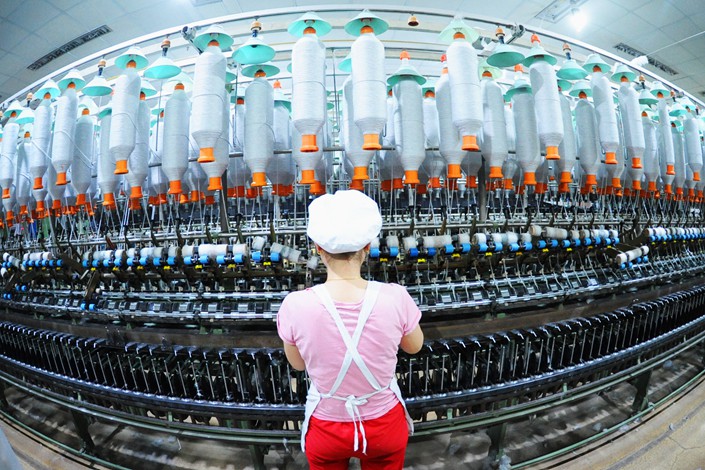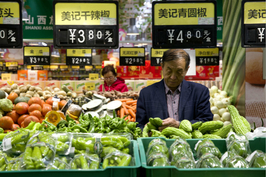Factory Inflation Hits Six-Month High

China’s factory inflation hit a six-month high in June mainly due to a lower comparison base last year and rising oil costs, while consumer prices remained stable, official figures showed Tuesday.
The producer price index (PPI), which tracks changes in the prices of goods circulated among manufacturers and mining companies, increased 4.7% year-on-year in June, the fastest rate this year, data from the National Bureau of Statistics (NBS) showed. It also beat a median forecast of 4.5% growth in a Bloomberg News poll of economists.
The consumer price index (CPI), which measures the prices of consumer goods and services, rose 1.9% in June from a year earlier, slightly higher than May’s reading of 1.8% and matching the analysts’ projection. The CPI rose 2% in the first half of this year, well below the government’s target of a 3% increase this year.
June’s PPI rebound in inflation was partly driven by rising oil costs, with Brent crude futures surging 66% to $78 over the past 12 months, David Qu, an analyst with Australia and New Zealand Banking Group, wrote in a note. NBS data showed domestic crude and natural gas surged 32.7% year-on-year last month.
“We expect domestic fuel prices in China to continue to accelerate, which will in turn exert further upward pressure on the PPI,” he said, predicting factory inflation to reach 4% for the full year.
NBS analyst Sheng Guoqing said the pickup in the PPI last month was mainly due to low comparison figures a year ago, noting that the base effect contributed 4.1 percentage points to June’s reading.
On a monthly basis, the PPI edged up 0.3%, slowing from May’s gain of 0.4%.
The CPI growth was led by rising food prices and increasing costs of medical and health care, education services, transportation fuel prices and rent, according to NBS figures.
The National Development and Reform Commission (NDRC), the country’s top economic planning agency, on Tuesday raised the retail prices of gasoline and diesel by the largest margin this year following recent climbs in global oil prices. It was the eighth hike by the NDRC this year.
The newly introduced Chinese tariffs on imports of U.S. agricultural products may pose some upside risks to food inflation, but the impact is expected to be offset by weakening domestic demand as economic growth slows, said Julian Evans-Pritchard, an analyst with research firm Capital Economics.
The trade war between the world’s two largest economies began on Friday, with China implementing retaliatory tariffs on U.S. goods, such as agriculture and aquatic products, in response to new U.S. tariffs on Chinese imports.
The subdued inflation will give China’s central bank “ample room to further loosen monetary policy” in the coming months to boost economic expansion, Evans-Pritchard said in a note.
Contact reporter Lin Jinbing (jinbinglin@caixin.com)

- 1Cover Story: China Carves Out a Narrow Path for Offshore Asset Tokenization
- 2Drownings Shake Chinese Enthusiasm for Travel to Russia
- 3Over Half of China’s Provinces Cut Revenue Targets
- 4Li Ka-Shing’s Port Empire Hit by Forced Takeover Amid Panama Legal Dispute
- 5In Depth: China’s Mutual Fund Industry Faces Overhaul After a Banner 2025
- 1Power To The People: Pintec Serves A Booming Consumer Class
- 2Largest hotel group in Europe accepts UnionPay
- 3UnionPay mobile QuickPass debuts in Hong Kong
- 4UnionPay International launches premium catering privilege U Dining Collection
- 5UnionPay International’s U Plan has covered over 1600 stores overseas






